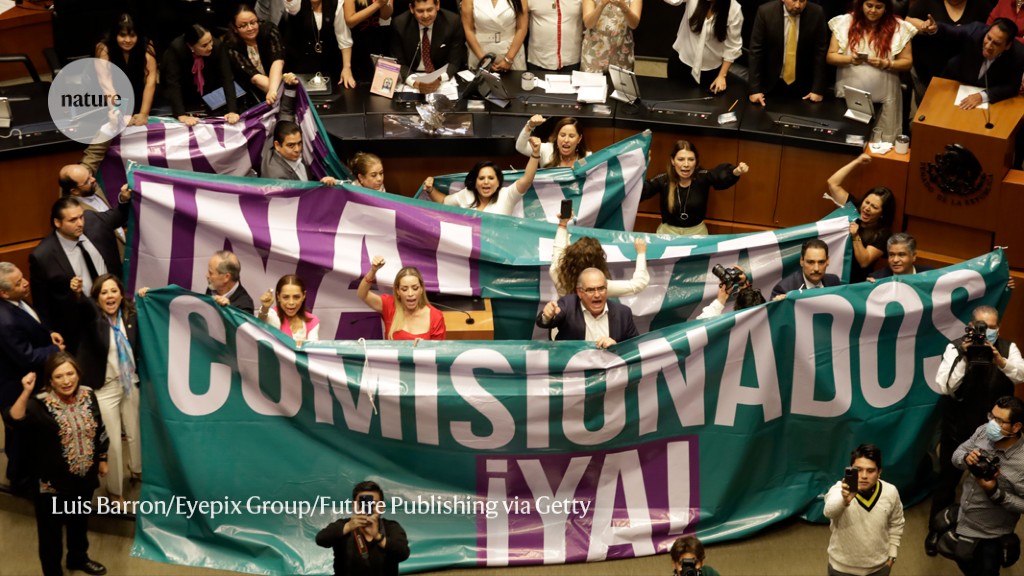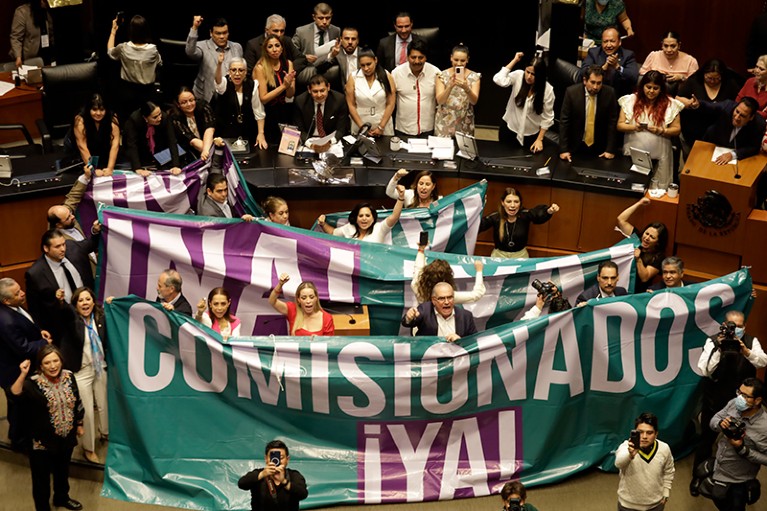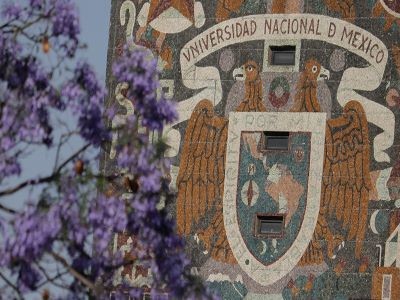Opposition politicians hold a protest in Mexico’s Senate.Credit: Luis Barron/Eyepix Group/Future Publishing via Getty
More than 14,000 people have signed a letter protesting the approval of a new science law in Mexico on 29 April. Researchers are organizing a march against it later this month and even calling for a strike. They say that the legislation — the General Law on Humanities, Sciences, Technologies and Innovation — consolidates power over science with the government and ignores the wishes of the research community. And they are angry that Mexico’s ruling party, that of President Andrés Manuel López Obrador, rushed the law through — the approval didn’t follow normal parliamentary procedures, the researchers say.
Frustration builds over lengthy delay in revamping Mexico’s science law
The process was “atypical” and “irregular” says Fidel Sánchez, a bioinformatics researcher at the National Autonomous University of Mexico in Mexico City.
The law’s passage adds to tensions between the research community and Obrador’s administration, which has slashed science funding in Mexico and accused some scientists of organized crime.
The law has been four years in the making. Shortly after Obrador took office in 2018, the country amended its constitution to guarantee people the right to “enjoy the benefits” of science and technology. Officials then proposed updating Mexico’s science law to align with this idea.
The scientific community worried that the country’s main science agency, the National Council of Science and Technology (Conacyt), would dominate the process. So a series of discussion sessions were organized at which academic researchers and directors of educational institutions could express their views. Delays ensued because of the COVID-19 pandemic and disagreements among parties. This year, the government proposed holding seven official discussion forums, but only a few actually happened before last month’s vote rushed the legislation through, alongside 19 other laws in a fast-tracked process.
Controversial changes
Although it sounds like a positive thing to guarantee the right to enjoy the benefits of science, Sánchez says a big problem with the legislation is that it is vague about how that will be ensured. Another issue is that, according to the law, a government council will prioritize science projects on the basis on their potential to solve national problems. This could diminish funding for basic science, Sánchez says. “How are we going to have a law that allows us to comply with the constitutional right that people have to education, science and its benefits, if we do not have the freedom of how we do science?”
Attempt to charge Mexican scientists with ‘organized crime’ prompts international outcry
That council will comprise the director of Conacyt — which the law transforms into the National Council for the Humanities, Science and Technology (Conahcyt) — as well as representatives of several government ministries and eight members of the scientific community. An internal advisory body, chaired by Conahcyt’s director, will vet the scientists. This structure doesn’t guarantee a “plurality of voices”, says Alma Cristal, a chemist and president of the Mexican Society for the Advancement of Science in Mexico City.
The law also specifies that if a project receives funding from the government, any intellectual property that results will be owned by the government unless otherwise agreed, Cristal says. The problem with Conahcyt keeping the intellectual property “is that it doesn’t have the mechanisms, facilities or the human or material resources to take that intellectual property and transfer it into products”, she adds.
Researchers also worry that the new law introduces a change affecting science spending. The previous law specified that 1% of the country’s gross domestic product should be invested in science, although Mexico never met that goal. Now the law specifies “that you can’t invest less than the previous year”, Sánchez says. This means that if the government increases the amount by only one peso (US$0.057) per year, it will be complying with the law. “There is no obligation to grow.”
In a press release issued the day after the law went into effect, Conahcyt said that the legislation “is the result of an extensive 4-year process of dialogue and consensus, in which more than 70,000 people and institutions participated”. The agency did not respond to Nature’s request for comment by the time this story was published.
High points
Not all scientists are against the new science law. Juan Martínez, a biologist at the Institute of Ecology in Xalapa, says some of his colleagues are “totally in favour”.
Mexican science suffers under debilitating budget cuts
Others say the law has high points, even if they disagree with its overall direction. Cristal, for example, says its wording is more inclusive, and it mentions the aim of placing scientific staff in the country’s embassies. It includes “some good wishes related to scientific diplomacy”, she says, but doesn’t specify how to achieve them.
Given the discontent with the law, it will probably be challenged in court. People and institutions have 30 days from 8 May, when it was enacted, to file suit. Martínez expects that the law will be modified: “If the judges consider that the constitution hasn’t been respected, they are going to suggest to the legislature some kind of correction.”










More News
Daily briefing: Why exercise is good for us
Daily briefing: Orangutan is first wild animal seen using medicinal plant
Old electric-vehicle batteries can find new purpose — on the grid